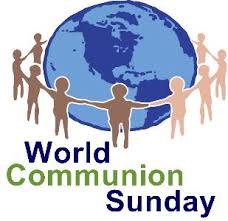
Exodus 33:12-23; Matthew 22:15-22
An Internal Revenue inspector walks into a church and asks to see the pastor. He is shown to the pastor’s office and is offered a seat. "pastor, I believe a member of your congregation, Ms. Smith, states on her tax return that she has donated $100,000 to the church. Tell me, Pastor, is this correct?" The pastor answers, "Yes, it will be!"
Taxes. They are the bane of our daily existence.
The Jewish population in Jesus’ day found themselves paying roughly 30-40% of their income and produce in taxes to Rome and to the Temple. There were grain tolls, taxes on produce, sales taxes, various temple taxes, tithes and sacrifices; occupational taxes, custom taxes, transit taxes, and other taxes, including illegal extortion allowed by tax collectors.
People dislike taxes, and tax collectors, then as now. Yet the gospels go to great lengths to show that Jesus frequently spent time with tax collectors. He hailed and selected to stay at the home of a prominent tax collector, Zacchaeus. He selected tax collector Levi, also named Matthew, as an apostle. Jesus openly paid his and Peter’s temple tax (Matthew 17:24 – 27). Despite this, Jesus’ detractors (in Luke 23:2) accuse Jesus of "forbidding us to pay taxes to the emperor" as part of their scheme to have Jesus killed.
Today’s gospel controversy centers on taxes paid to Rome. Understandably they were highly contentious. It was a reminder that Israel was a conquered nation, and they had to pay for that occupation and protection. The tax in question was the annual tribute tax to Rome. Jews were divided about this tax. The Temple authorities had chosen to collaborate with Rome and endorsed the tax. They also enjoyed a kick-back from the collected funds for their own personal use. But many orthodox Jews resisted this tax and often got themselves into trouble.
So in our gospel lesson we see some bible frenemies: The Pharisees (religious separatists) and the Herodians (advocates of the ruling class and status quo), team up to trap their common opponent, Jesus, with the no-win question: "Is it lawful to pay taxes to the emperor, or not?"
This annual Roman tax was the equivalent of a laborer's daily wage. The tax had to be paid with a Roman coin, the denarius, which had the image of the emperor stamped on one side and an inscription on the other: "Tiberius Caesar, august son of the divine Augustus, most high priest." For many religious people, possessing and using the coin was blasphemy against God's law, particularly the commandments against graven images and idolatry.
Jesus’ answer stuns his adversaries. “Whose image” or “likeness” is on the denarius? Jesus asks them. “Caesar” is the reply. So, Jesus declares, "Give, or give back, to the emperor the things that are the emperor's "and to God the things that are God's." Jesus flips the question and forces the Pharisees and Herodians to address a more important issue: Giving back to God what is God’s.
The denarius bore the image of the emperor’s face. But it is the unseeable face of God that we owe tribute to, as Moses discovers on the mountaintop.
Moses prays: Now if I have found favor in your sight, show me your ways, so that I may know you and find favor in your sight. Consider too that this nation is your people…. Show me your glory I pray.” God tells Moses that it is impossible to see God’s face and life. God’s face, unlike Caesar’s -- cannot be seen – but yes, it can be traced in goodness, graciousness and mercy. We, who are made in the image and likeness of God, (Genesis 1:26-27) are also are stamped with goodness, graciousness (or goodwill) and mercy.
In essence, we are like those coins the Herodians and Pharisees held up to Jesus. We are God’s currency on earth. We are living, breathing coins; and we get to decide how we will fund with our lives. So, through our lives we fund the well-being of our family. Through our lives we fund our education, our vocation, our wardrobe, our housing, our food. Through our lives we fund our entertainment—movies, theater, books, vacations. Well and good – but the tax God has placed on us is one of service and care – we give back to God in giving to others.
Paul puts it this way for us in his letter to the Romans: “8 Let no debt remain outstanding, except the continuing debt to love one another, for whoever loves others has fulfilled the law- Romans 13:8” This is how we are to manifest God’s unseeable Face in the world. We owe a debt of love. We bear that image of God revealed on Mt. Sinai - goodness, graciousness (or goodwill) and mercy – in how we chose to connect to our communities, to our church, to the stranger, outcast, ill, needy in our midst.
Jim Cymbala, pastor of the Brooklyn Tabernacle Church, shares a story that reminds me of the debt we owe in bearing and bringing forth God’s image in the world. Jim says it was Easter Sunday and he was so tired at the end of the day. He looked up and there in about the third row was a man who looked about 50, disheveled, filthy. He looked up at Jim rather sheepishly, as if saying, "Could I talk to you?" Jim thought to himself, though he felt ashamed later, "I've had such a good time, preaching and ministering, and here's a fellow probably wanting some money for more wine."
The man got up and walked to Jim with hair matted; front teeth missing; eyes slightly glazed. When he got within about five feet of Jim, he smelled a horrible smell like he never smelled before. It was so awful that when he got close, Jim would inhale by looking away, and then he’d talk to him, because he couldn't inhale facing him. Jim learned that the man’s name was David, he was 32 (although he looked 50) and had been living on the streets for six years.
Jim fumbled to pick out some money to give to David. David put up his hand and said, "I don't want your money. I want this Jesus, the One you were talking about, because I'm not going to make it. I'm going to die on the street." Jim started to weep. He realized he automatically reached for the money because it was the easiest way to get rid of David. Jim realized – David was sent to him – as a face of God – to show Jim God’s glory. Jim’s debt of love to God was to be paid to Jim. That is what goodness is all about. That is where God’s glory is found.
Jim could have made the excuse that he was tired. It’s understandable. We all do it. He didn’t see David the way God saw him. Jim was not feeling what God felt. Jim prayed for forgiveness Please forgive me God. I am so sorry to represent You this way. I'm so sorry. He prayed. He began to cry right there.
Jim started to weep deeper and David began to weep. David fell against Jim’s chest and there they wept on each other. The smell of David’s person became a beautiful aroma. The Lord made it real to Jim: If you don't love this smell, I can't use you, because this is why I called you where you are. This is what you are about. You are about this smell.” The smell, Jim realized, was the aroma of God.
That day David gave his life to Christ. He got sober, with help got housing. Jim walked with David all along the way. Amazingly, eventually David was ordained and became an assistant minister in New Jersey.
That is giving back to God what is God’s – a broken life, transformed and redeemed. That’s our tax – to heal what is broken –to care for the ill. We make God’s glory visible through our deeds, our witness and our gifts to love, divine currency from our hand to our neighbors. amen



 RSS Feed
RSS Feed